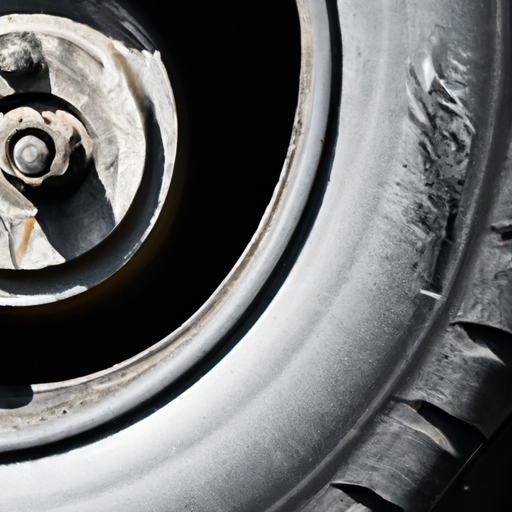You’ve probably experienced the frustrating and sometimes dangerous situation of having your wheel studs break multiple times. It’s a common problem that leaves many car owners puzzled and searching for answers. In this article, we will explore the possible reasons behind why your wheel studs keep breaking and provide some helpful tips to prevent future occurrences. Stay tuned to uncover the secrets behind this perplexing issue.

Common Causes of Wheel Stud Breakage
Wheel stud breakage can be a frustrating and potentially dangerous issue for any vehicle owner. But understanding the common causes of this problem can help prevent it from occurring in the future. In this article, we will explore ten common causes of wheel stud breakage and provide tips on how to avoid them.
1. Over-Torquing
Over-torquing occurs when the wheel nuts are tightened beyond the recommended torque specifications. This excessive force can put excessive stress on the wheel studs, leading to their breakage.
Effects of Over-Torquing
Over-torquing can cause the wheel studs to stretch beyond their limits and weaken over time. This can result in thread deformation, stud fatigue, or even stud failure.
Recommended Torque Specifications
To avoid over-torquing, it is crucial to follow the manufacturer’s recommended torque specifications. These specifications can usually be found in the vehicle’s owner manual or provided by the wheel manufacturer. Using a torque wrench is highly recommended to ensure the nuts are tightened to the correct torque.
Proper Torqueing Procedures
When torqueing the wheel nuts, it is essential to do it in a star pattern or crisscross pattern. This method ensures even distribution of the torque and reduces the risk of uneven stresses on the wheel studs.
2. Improper Installation
Improper installation can also contribute to wheel stud breakage. It is crucial to follow proper installation procedures to minimize the risk of stud failure.
Lack of Wheel Stud Lubrication
During installation, it is recommended to lubricate the wheel studs to reduce friction. This lubrication helps prevent galling or stripping of the threads and allows for smooth, even tightening of the wheel nuts.
Incorrect Stud Length
Using wheel studs of incorrect length can also lead to stud breakage. The studs should be of the appropriate length to ensure proper engagement with the wheel nuts. Studs that are too short may not provide enough thread engagement, while studs that are too long can bottom out inside the hub and cause excessive stress.
Cross-Threading
Cross-threading occurs when the wheel nuts are not properly aligned with the stud threads during installation. This can damage the threads and weaken the stud, making it more prone to breakage. It is essential to start the nuts by hand and ensure they are properly aligned with the stud threads before using a wrench.
Loose Wheel Nuts
Failure to properly tighten the wheel nuts can cause them to loosen while driving, leading to stud failure. It is important to use a torque wrench to ensure the nuts are tightened to the recommended torque specification.
3. Thread Damage
Thread damage can occur due to various reasons and can significantly weaken the wheel studs.
Thread Galling
Thread galling is a type of thread damage that happens when the threads seize and lock together during tightening. This can result in damaged or deformed threads, making the stud more susceptible to breakage.
Thread Stripping
Thread stripping occurs when the threads become worn down or stripped away, generally due to excessive force or improper installation. Without proper thread grip, the stud’s integrity is compromised, increasing the risk of stud failure.
Incorrect Wheel Nut Type
Using the wrong type of wheel nuts that do not match the stud’s thread pitch or diameter can cause thread damage. It is essential to use the proper wheel nuts specified for the vehicle and the studs.

4. Corrosion
Corrosion is another common cause of wheel stud breakage, particularly in regions with harsh climates or where road salt is used.
Effects of Corrosion
Corrosion can cause the wheel studs to weaken and deteriorate over time. This weakening can lead to stud failure, especially when combined with other factors, such as over-torquing or thread damage.
Causes of Corrosion
Corrosion can occur due to exposure to moisture, road salt, or other corrosive substances. It is important to regularly inspect the wheel studs for signs of corrosion and take preventative measures to minimize its impact.
Preventing Corrosion
To prevent corrosion, it is advisable to regularly clean and inspect the wheel studs. Applying a corrosion-resistant lubricant or protective coating can also help prolong the lifespan of the studs.
5. Axle Misalignment
Axle misalignment occurs when the axles are not properly aligned with the wheels, resulting in uneven stresses on the wheel studs.
Effects of Axle Misalignment
Axle misalignment can cause excessive stress on certain wheel studs, leading to their breakage. Uneven loading on the studs can be caused by worn or damaged suspension components, improper installation, or accident damage.
Causes of Axle Misalignment
Axle misalignment can occur due to various reasons, such as worn or damaged suspension components, improper installation of axles or wheels, or collision damage. It is crucial to address any alignment issues promptly to prevent further damage to the wheel studs.
Aligning the Axle
If you suspect axle misalignment, it is recommended to have the vehicle inspected by a qualified mechanic or alignment specialist. They can diagnose and correct any alignment issues to avoid unnecessary stress on the wheel studs.

6. Excessive Vibration
Excessive vibration can contribute to wheel stud breakage, particularly when combined with other factors, such as over-torquing or thread damage.
Effects of Excessive Vibration
Excessive vibration can cause the wheel studs to loosen or weaken over time. This can result in thread damage, stud fatigue, or even stud failure.
Causes of Excessive Vibration
Excessive vibration can be caused by various factors, including unbalanced wheels, damaged suspension components, or worn-out tires. It is important to address any vibration issues promptly to prevent further stress on the wheel studs.
Balancing the Wheels
To minimize excessive vibration, it is essential to regularly balance the wheels and properly maintain the suspension components. Balancing the wheels ensures even distribution of weight, reducing the stress on the wheel studs.
7. Wheel Impact or Collision
Wheel impact or collision can cause sudden and severe stress on the wheel studs, leading to their breakage.
Effects of Wheel Impact or Collision
Wheel impact or collision can result in immediate stud failure or internal damage that weakens the studs over time. This can be caused by hitting potholes, curbs, or other obstacles on the road.
Avoiding Impact or Collision
To avoid wheel impact or collision, it is crucial to drive cautiously and be mindful of road conditions. Avoiding potholes, curbs, or other obstacles can significantly reduce the risk of wheel stud breakage.
Inspecting for Damage
After any impact or collision, it is important to thoroughly inspect the wheel studs for signs of damage. If any damage is detected, it is advisable to have the studs replaced promptly to prevent further issues.

8. Wheel Stud Fatigue
Wheel stud fatigue occurs when the studs are subjected to repetitive stress, causing them to weaken and eventually break.
Causes of Wheel Stud Fatigue
Wheel stud fatigue can be caused by a combination of factors, such as over-torquing, excessive vibration, or inadequate maintenance. The studs may gradually weaken over time until they reach a point of failure.
Detecting Fatigued Studs
Regular inspection is crucial to detect signs of wheel stud fatigue. Look for any visible cracks, deformation, or elongation of the studs. If any signs of fatigue are found, it is important to replace the studs immediately to prevent stud failure.
Replacing Fatigued Studs
When replacing fatigued studs, it is essential to use high-quality, properly sized replacements. Follow the manufacturer’s recommendations for installation procedures and torque specifications.
10. Inadequate Maintenance
Inadequate maintenance can contribute to wheel stud breakage over time. Proper care and regular inspections can help prevent this issue.
Regular Inspection
Regularly inspecting the wheel studs for signs of damage or wear is crucial in preventing breakage. Look for any visible cracks, corrosion, or other indications of potential issues.
Proper Cleaning and Lubrication
Clean the wheel studs regularly to remove dirt, debris, and corrosive substances. Lubricate the studs with a corrosion-resistant lubricant to reduce friction and prevent thread damage.
Replacing Worn-out Parts
If any components, such as wheel nuts or suspension parts, show signs of wear or damage, it is important to replace them promptly. Worn-out parts can contribute to wheel stud breakage and compromise overall safety.
In conclusion, wheel stud breakage can be caused by various factors, including over-torquing, improper installation, thread damage, corrosion, axle misalignment, excessive vibration, wheel impact or collision, wheel stud fatigue, low-quality wheel studs, and inadequate maintenance. By understanding these common causes and following proper installation and maintenance procedures, you can minimize the risk of wheel stud breakage and ensure safer driving experience. Remember to regularly inspect, clean, and replace worn-out parts to keep your wheel studs in optimal condition.

